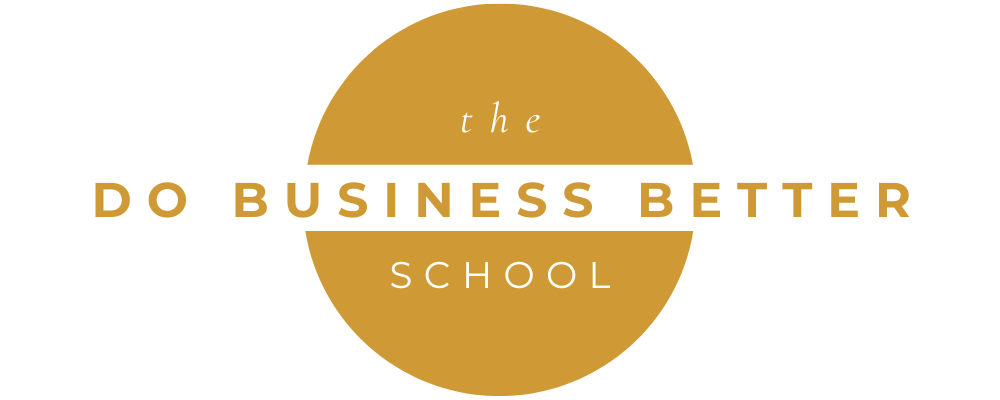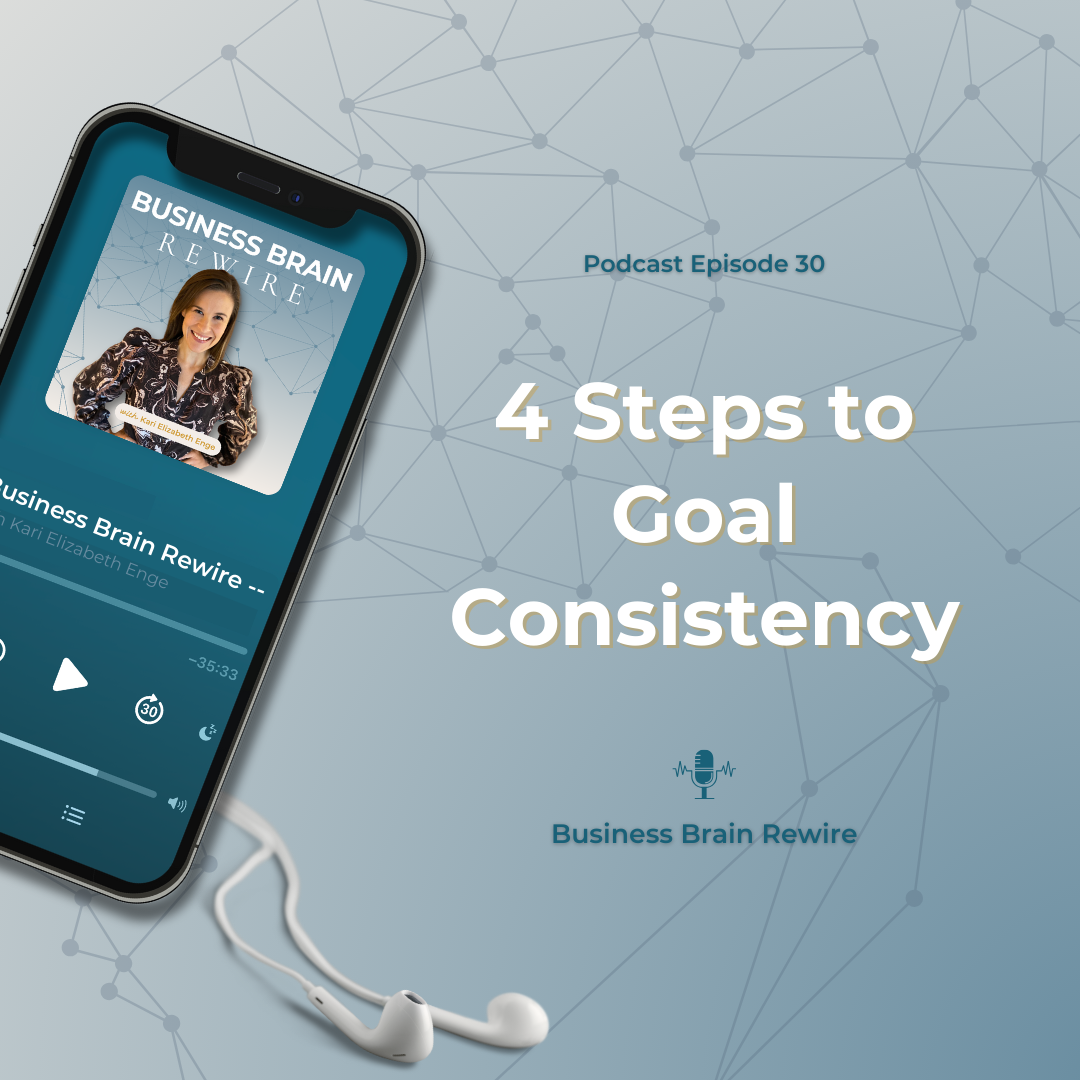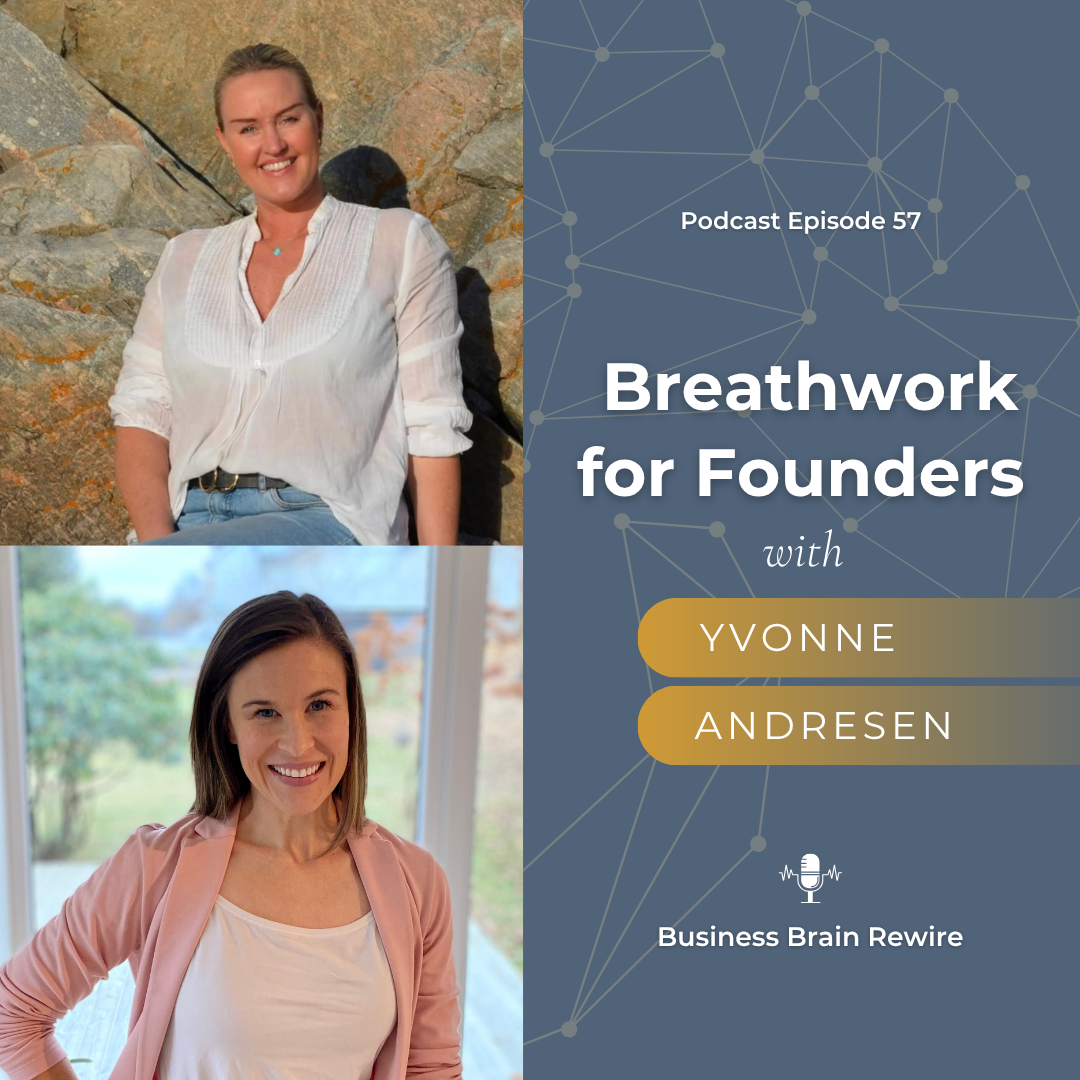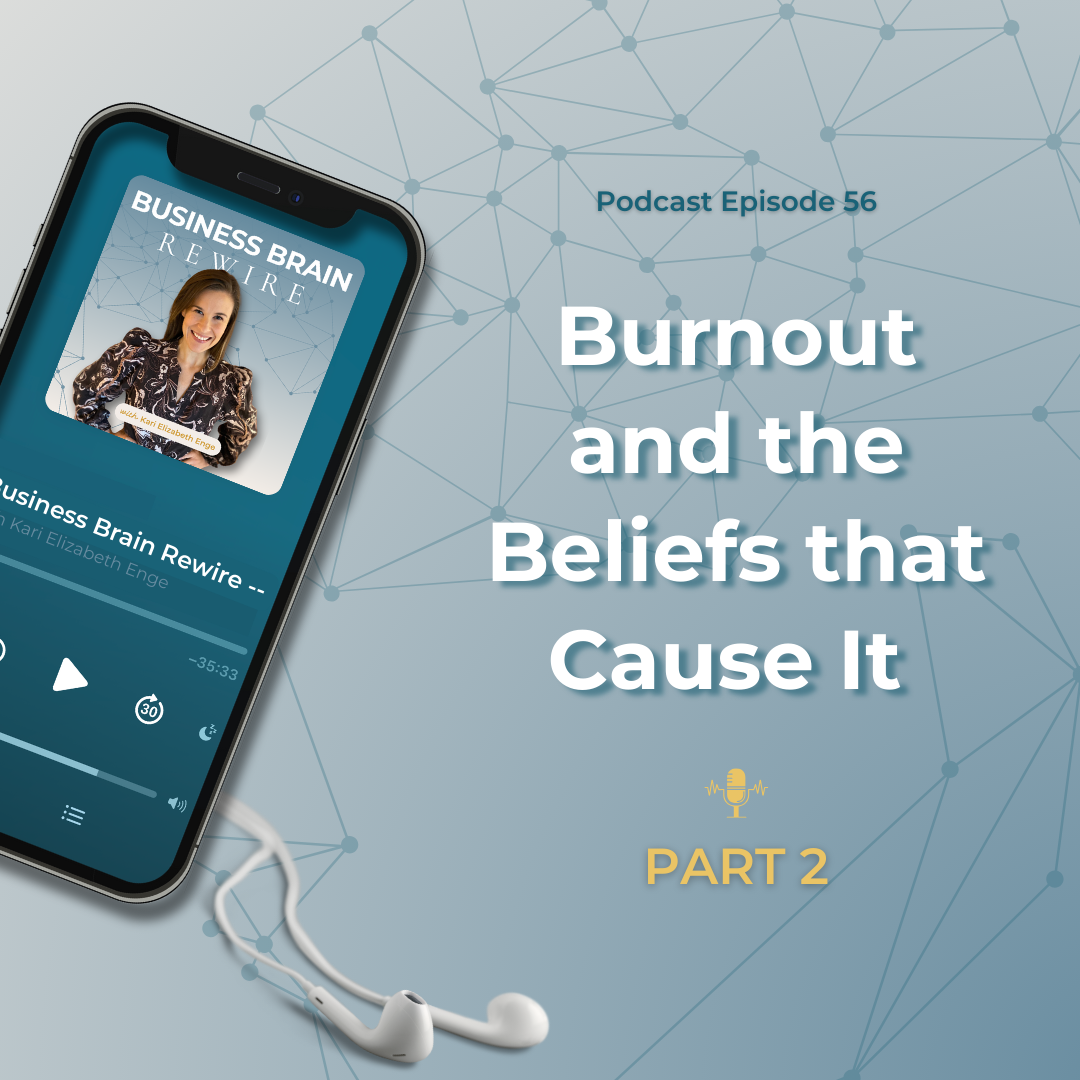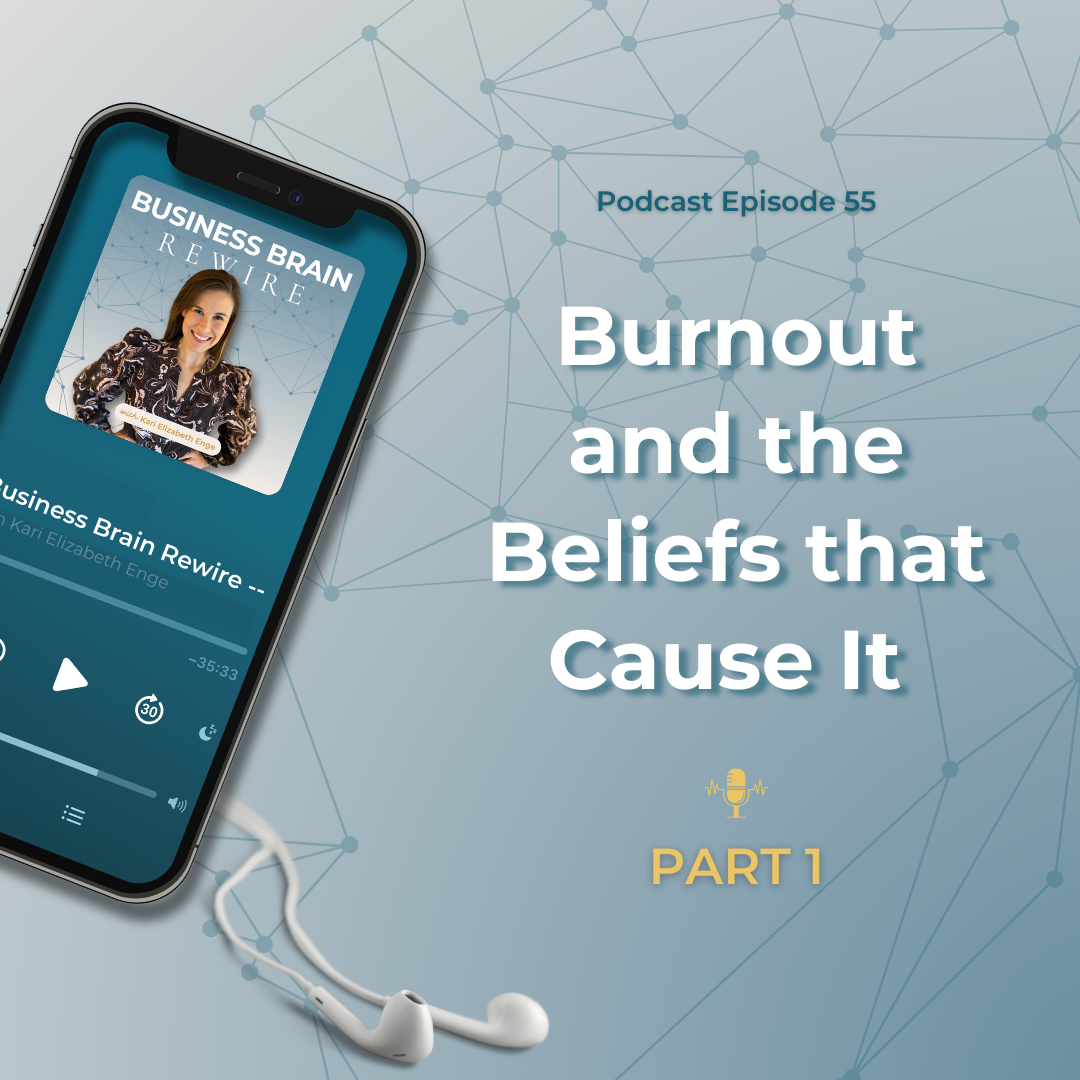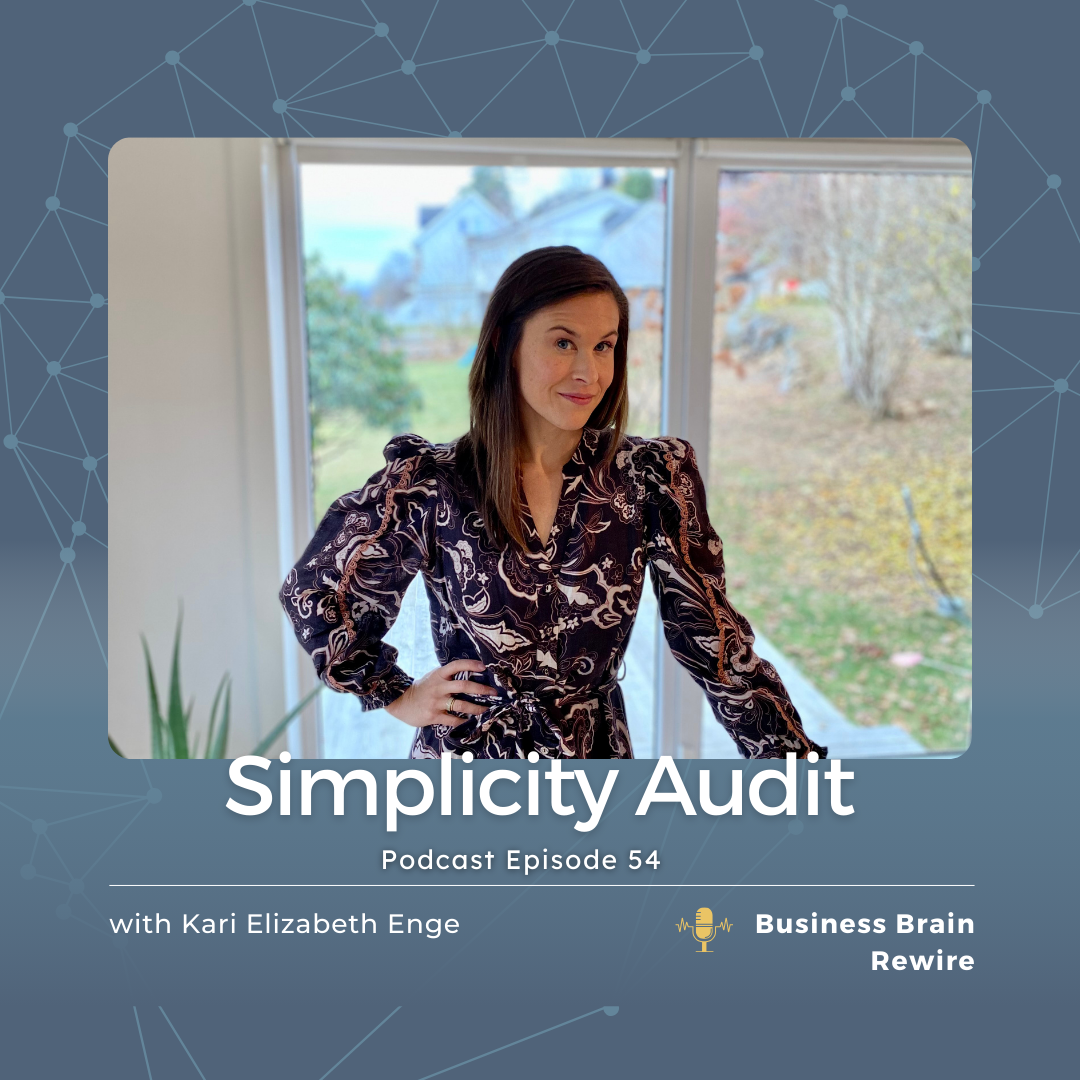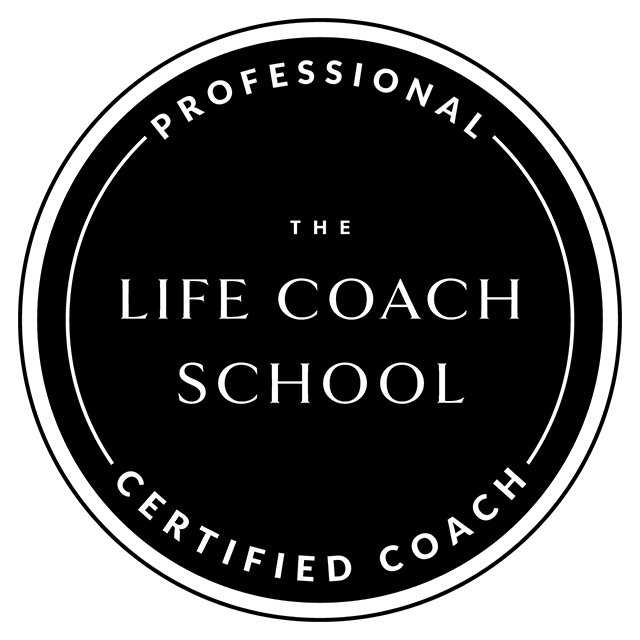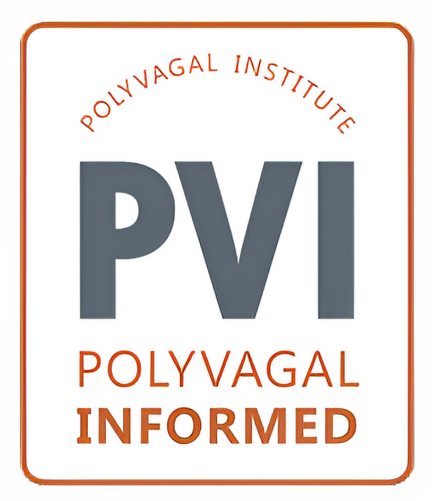You know that consistency is important for company growth.
But knowing you need consistency and being consistent are two different things.
Today, I’m breaking down consistency into 4 easy steps so you know how to make more money and more impact this year.
It’s not rocket science, but the 4 steps are needed to achieve your goals with more ease.
So in this episode, you’ll learn what the 4 steps are and how to approach each one so you are well on your way to getting your goal DONE this year.
I hope you also join me for my 21-day Nervous System RESET Challenge where you’ll learn exactly how to work in the Play State of Founder Peak Performance, improve sleep and stillness each day, and reach goals faster with more speed and ease.
The tools you’ll learn will naturally help you step into bigger goals with more ease, and stay grounded, focused and objective as you move your strategies forward. Click here to join.
Ok, back to today’ show.
Here’s what you’ll learn in today’s episode:
- The 4 steps for building consistency
- How to figure out which strategies to focus on this year
- How to build momentum on your goal day after day
- How to learn from what is working and what is not
Mentioned in today’s episode:
#1: In Simply Sustainable, I not only give you the goal achievement system you need to reach your goals with speed AND ease, I walk you through implementing, evaluating and troubleshooting the process until it clicks. The tools are simple, easy to implement, and move the needle using the latest neuroscience. 💻
Book a call now, to become a smarter, structured, strategic founder.
#2: Every Monday, I share a neuroscience-based strategy to grow your company that you won’t find anywhere else. Subscribe to get access to the systems you need for sustainable success. 📥
#3: Get on the FREE CEO Session with me this December and let’s figure out what’s in your way, solve for it, and set you up with the skill sets you need.
Click here to pick a spot on my calendar. There are limited time-slots just for the next couple of weeks so book now and make it a priority. 🎄
Transcript:
[00:00:00] Hello and welcome to this week’s episode. We are in episode 30, the final episode of 2024 if you are listening to this live. I’m really excited about today’s episode because, although we’re going to be talking about something that’s really timely as we wrap up the year and head into the new year, the topic that we’re going to be covering today is evergreen. This is something that if you are listening to this years and years, if not decades later, you’ll still be able to pull so many good lessons learned and hopefully some golden nuggets from what I’m going to talk about today to apply to your business. These things apply to a startup and also to a scale up, it really does not matter what level you’re at. The things that we are going to talk about are so fundamental to scaling in a sustainable way.
[00:01:36] before we dive in, I have a gift for you. It’s Christmas. It’s that time of the year of giving and every year it’s a tradition of mine to gift my audience with a small number of mini CEO days. This is where you get to talk one on one with me, if you have never done so before, when we will dive into your vision and your strategies and your focus for the new year. We will evaluate the business, celebrate wins and get you fired up for all that you want to accomplish in the year ahead. The spots are limited, so to grab your spot, go to do business better school.com forward slash C E O dash day. I look forward to seeing you there. Okay. Let’s dive in
[00:02:22] Today, we’re going to talk all about goal consistency. This is something that I hear a lot of founders coming to me saying, I need to get structured. I need to be more consistent. I need to really move the needle in an organized way. I know that I tend. To not follow through with the plan or make decisions in a very structured, strategic way. I know we could be doing things smarter and I have a feeling that consistency is part of the puzzle that I need to solve in order to reach the next level.
[00:02:59] We’re going to be talking about consistency today in a way that I hope will help you to implement it in the new year to reach. that big goal of yours.
[00:03:08] Now, I want you to think about consistency, not as this thing to try to achieve. It’s not this thing that you need to strive for, and then to use like strictness or willpower or trying harder in order to achieve. I think that that’s, many times, the approach we take with consistency. We think we’re a school kid and we need to just try harder in order to be really good. Right? Good school kids.
[00:03:38] While that’s really a common way to approach any behavior change you want to make. It’s really not the most effective willpower. As we know from the latest neuroscience, just it doesn’t work. Right? That strict kind of discipline where you’re sort of against yourself and putting yourself down in an effort to just get yourself off your bum, we know just doesn’t work through attachment theory and through basically, yeah, just what we know about behavior change.
[00:04:08] So when you think about consistency, I want you to think about it as several CEO skillsets that we want to just practice through repetition until we achieve mastery. I want you to think of it almost like you’re learning to play a new sport and there’s several techniques with that new sport. Maybe it’s tennis and we need to learn how to serve the ball and we need to learn how to volley the ball. Am I even getting that correct? I don’t know. I don’t play tennis.
[00:04:41] You get my gist. There’s several different techniques and elements of the game and you have to practice each and every one of them separate from each other. You have to do that multiple times in order to master the skill. Then when you add all those individual skills up, you get the feeling of oh yeah, I can play tennis. That’s the same way that it is with consistency.
[00:05:04] So I like to break down consistency into four C’s. And those four CS are constraint, clarity, commitment, and celebration. These four CS are skillsets that you want to start practicing and supporting yourself to master over time and when you do, you will see, oh, I’m being consistent. You will see that consistent growth as well toward your goal, which is what you are really striving for.
[00:05:32] So we’re going to talk for the next several minutes about what these four CS actually are and how you can start practicing them individually, that way collectively you’ll see consistency in your business.
[00:05:44] The first C is constraint. It’s exactly what it sounds like. It’s basically just constraining down almost like you’re squeezing a piece of mash and you’re squeezing all the water out of it. If you were trying to, for example, make all men to milk and you’re taking some almonds and you’re soaking them and then you’re squeezing all the milk that comes out of the almonds. We’re squeezing the business. We are squeezing it to its bare bones in order to focus and extract just one thing.
[00:06:21] That’s what we want to be doing on a consistent basis in our business is constraining down to just a couple of needle movers, a couple of things that you’re really focused on in terms of your strategy. I like my founders to pick a three needle moving essentially for the year. This is the three things they get to focus on. They can be operational or they can be sales and marketing related, and if they’re at sales and marketing related, we don’t want to be too many places at once. Right? We just want to master one marketing channel at a time. This will really help to maximize the amount of testing and learning and tweaking we can do in a particular period of time. So that you can really see growth on that channel.
[00:07:08] Then of course, once we’ve gotten that to a particular level and we have optimized it to make it faster, to actually take those action steps on that marketing channel, we can delegate it and move on to learning the next channel.
[00:07:23] This helps to really simplify the business so that you can get into that entrepreneurial cycle, that I teach, where you are strategizing, implementing, evaluating, tweaking, and then going again over and over and over again, to see that momentum burrowing. It’s really not possible if you’re trying to do this for several different things at a time. Especially if it’s just you and a co-founder or a small group of contractors. I see this all the time with startups, that they just have a level of inexperience with how much it actually takes to conceptualize design and implement a sales funnel, as well as how much time it takes to evaluate it and tweak it on a regular basis. They spread themselves really thin and they think they need to be everywhere. They use terms like we just need to build thought leadership and we need to get out there. Yet, they’re like spattered paint on the wall because they’re not constraining down and really keeping their marketing strategy constrained.
[00:08:29] Simplicity is always going to help you to grow faster in the end. A lot of founders think that that’s the opposite. That they have to do everything right now in order to reach their goal.
[00:08:40] So I want you to start to love simplicity in your business, to love the idea of constraining down, and that means that you’re going to have to leave a lot on the metaphorical nightstand. You’re going to have to have all those ideas coming into your brain, and say, Ooh, that’s a good one. We’re going to just leave it to the side because we’ve constrained down to just these three things for the year.
[00:09:03] Number two for building consistency is clarity. Once you’ve constrained down the things that you need to be consistent with, right? That’s obviously going to make it easier. We need to get clarity around what is actually required. Again, that can probably be simplified even more, if you stretch yourself to say, okay, what do we actually need to do to move the needle with this marketing channel? What do we actually need to do to reach the next milestone? It’s probably more simple than you think. If you send your brain there and try to problem solve that. But once, you know, okay, this is the strategy and this is the constraint down list of things we’re going to do. We need to have clarity around what we’re doing, what needs to be designed, what needs to be conceptualized, who’s going to do it, when it’s going to fly. We also really need to get clarity around when we are going to evaluate that and make tweaks. This is something that I never did in the beginning. I never had a specific entrepreneurial cycle in mind. I never had a, what I now call, an entre cycle round in my head. For example, I would never say, okay, I’m going to try this strategy for five days. Then I’m going to look at the data and I’m going to see what’s working and what’s not, and then I’m going to tweak it, I’m going to go again. I never did that. I knew that I needed to kind of look at data. But I wasn’t doing it in such an intentional and structured way. And although accelerators are teaching this idea of the lean startup methodology. They’re not actually using it in practice and showing founders how to use this in practice. This is exactly what we do with the do business, better school. We take the lean startup methodology and we say, here is the structure, here are the processes and here’s the mindset that you use to actually strategize and implement and evaluate using the lean startup methodology in a way that holds the business in this container.
[00:11:25] This container that we provide and this tool kit that we provide founders actually helps them to find consistency and it gets them so much more clarity around. What they’re doing and what really matters. You’d be surprised at how much of inconsistency is born from a lack of clarity. There is a lack of clarity around the vision. There’s a lack of clarity around what’s important. There’s a lack of clarity around the marketing channels and exactly how you want to show up there. Or a lack of clarity around the messaging.
[00:11:57] When your brain has a lot of unmade decisions floating around it, won’t motivate you to take action in that area. It’s just sort of this mechanism to help you stay safe. Right? If you don’t know what you’re doing, your brain’s like, I dunno, let’s just wait on that. If it doesn’t know if you are prepared, if you are qualified or if the outcomes are in your fever. So that’s why constraining down the amount of things you need to make decisions for us really smart. Because your brain can only focus on one thing at a time. And why getting really clear on what you’re going to do there can naturally help motivate consistency.
[00:12:38] Now the third C of a consistency is commitment, because once you constrain down and you get clear, there is a level of commitment that you’ll have to have. This is where a lot of entrepreneurs get stuck and they want to throw discipline and willpower into the picture. Commitment is slightly different.
[00:13:00] Commitment is a decisiveness. It is a partnering with yourself. It is supporting yourself, because you’ve decided, and that’s what you’re going to do so much so that you have your back when things don’t go, how you originally planned, because you are committed to that dream. You’re committed to learning that thing. It involves self-trust. It involves self-belief and it has to always include this kind inner dialogue. This kind of self-talk. The discipline and the willpower is the opposite. It’s about being against yourself and beating the crap out of yourself in order to motivate yourself, which is what we don’t want. We want such clarity and conviction around just the few things that we’re doing. A commitment to see it all the way through. We also need a commitment to have our back the entire way.
[00:14:03] That is really the essence of what we teach our kids when they learn a sport. Right? Going back to that tennis example. They have to have their back through every single mistake they have to commit to practicing, even when they can’t get the skill and they have to commit to that. Self-talk that inner dialogue that’s positive when they lose the game, otherwise they just won’t ever play and show up again. Right? So that’s why we love putting our kids in sports because it teaches them this commitment in a really positive environment.
[00:14:38] You have to do the same thing in your business. You have to commit to your dreams, but in a way that’s supportive of you. Not despite you and your current levels of behavior or follow through. The more that you have your back and you just keep going and learning, the more you will find that it’s easier to be consistent.
[00:15:03] Now it’s really interesting because a lot of entrepreneurs also want confidence in order to be consistent. That’s something that you want to be really mindful of and catch if you ever fall into this place where you’re craving that confidence and that sense of control in order to show up.
[00:15:22] I talked about this in the last episode, so you might want to go back and listen to that as well, but, it’s really important that we don’t ever strive for that artificial feeling of control using confidence because confidence never comes ahead of time. Confidence comes from experience of following that entrepreneurial cycle and evaluating and testing and tweaking it and doing it over and over and over again and rinsing and repeating, to the point where it becomes a habit.
[00:15:50] It’s only through that trial and error that we actually build confidence in a skill. We have to go through that level of clarity and then commitment, and then tap into courage using a kind inner dialogue, whenever we are trying something new and eventually that will create confidence. When you really constrain down, simplify, go all in, see your decisions all the way through and commit to those, and you evaluate on a regular basis. You’ll build your self-trust in your ability as a founder, as a cEO.
[00:16:30] All right. So there’s the business and what the business is doing and how the business is growing, and then there’s how you view yourself as a competent qualified leader of your company, a qualified founder. The more you practice these skill sets that we’re talking today, the more you’ll build that confidence. You’ll see that that inner confidence will have ripple effects on how you feel about the business. It’s really fun as a business coach to see that when you build confidence in the founder, the confidence in the business grows and then guess what happens? The business grows. You really want to be tapping into that supportive type of commitment when you’re thinking about consistency.
[00:17:08] The last C of this consistency puzzle is celebration. I think this is a really timely thing to add to this podcast episode, because we are at the end of the year. Almost all founders, they use december 31st as like a stake in the ground to assess their worth. It can be a slippery slope, right? Of feeling bad about what you have accomplished and also feeling the cognitive dissonance of not having gotten to your next goal. For founders, we always just move the carrot forward. Right? We’re always expanding what we want to do and so if you don’t have a great relationship with your founder self, yet celebration is something that can be really weak.
[00:17:53] We know that the more dopamine, and good feel hormones, that we gift to ourselves when we are inside of our business, the more our brain will want to go toward it. Right? It’s like Pavlov’s dog. We’re not that complex. We’re really quite basic creatures in some ways. Although very complex in other ways. You want to be giving yourself those moments of celebration often, and also doing that in a really strategic way. So you don’t just want to be like, woo, I brushed my teeth today and not focused on evaluating and moving forward. You do really want to celebrate how you’re showing up and how you’re sticking to your process, into your structure and showing up in bigger and bolder ways each time.
[00:18:41] That can involve just how you showed up and dealt with failure or how you built resiliency or how you learned a lesson. It doesn’t necessarily have to be a business outcome. That we want to celebrate and actually those failure points in how you are adjusting and pivoting with those failure points, is actually the most powerful way you can start to celebrate.
[00:19:05] Along with celebration and comes as a little asterisk, evaluation. Because in order to really know what to celebrate, you have to evaluate. You have to look at actual data to see where you’ve come from. To see how you’ve improved. So, of course you can just have a moment with yourself where you check in and you’re like, I’m really proud of myself for showing up when that was hard. But I also want you to look at the actual data. That will sometimes show growth and you can celebrate that. But it will sometimes show where you miss the mark. Where you didn’t reach the goal. Where the metric didn’t improve. Where you really tried this time to make more sales and your promotion fell flat. It’s in those moments where you can look at, okay, why didn’t that work? What’s my hypothesis? What can I learn and try next time? The best CEOs celebrate those aha moments of Ooh, I think I know what it might be. I think this next time, we will apply this learning and we might just figure this puzzle out. That kind of celebration of just the epiphany, what the data showed you, what the failure showed you, is the most beautiful type of celebration. That really gives you the motivation and that dopamine to keep following the entrepreneurial cycle of strategize implement, evaluate, and over and over again, in a consistent way until you reach the goal. Remember that consistency is not something that you just need to get better at, it is these four skillset, constraint, clarity, commitment, and celebration.
[00:20:45] As you move forward into the holiday, as you do your end of year evaluations, and as you really think about the strategy for the new year, I want you to practice these four CS.
[00:20:59] Throw old school consistency and willpower out the window, and let’s get more intentional with how we’re leading our business in 2025.
[00:21:09] If you want some help with evaluations and looking at your strategy and also celebrating where you’ve been and where you’re going,
[00:21:19] don’t forget to check out the mini CEO day signup page, which we will link to in the show notes to grab your CEO day or with me. I hope there’s still some spots available. So go over there and grab your spot. I look forward to diving into your strategy in the new year. Keep serving the world. Keep making sales and keep making time for self care. Have a beautiful end of the year. I will see you back here in January. Take care.
